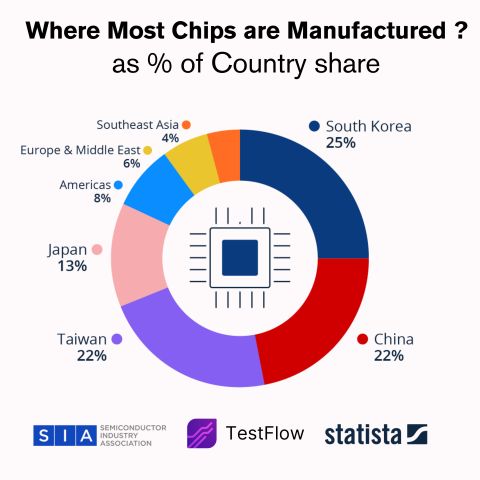TSMC's Semiconductor Manufacturing Dominance: How Taiwan Became the Silicon Kingmaker
With 54% of global foundry market share and exclusive production of the world's most advanced chips, TSMC has become the most critical company in the semiconductor supply chain. Discover how this Taiwanese giant achieved unprecedented dominance.

In the global semiconductor industry, one company stands above all others: Taiwan Semiconductor Manufacturing Company (TSMC). This Taiwanese foundry doesn't just lead the market—it defines it. With a market capitalization exceeding $500 billion and manufacturing capabilities that no competitor can match, TSMC has become the silent giant powering the world's technology.
From Apple's iPhone processors to NVIDIA's AI accelerators, TSMC manufactures the chips that power our digital world. But how did a company founded in 1987 in Taiwan become so dominant that it holds the entire tech industry in its hands?
TSMC by the Numbers
Market Dominance
Global foundry market share
Advanced node market share
Annual revenue (2024)
Global customers
Technology Leadership
The Rise of TSMC: From Startup to Silicon Kingmaker
The Foundry Model Revolution
When Morris Chang founded TSMC in 1987, the semiconductor industry operated on an Integrated Device Manufacturer (IDM) model—companies designed and manufactured their own chips. Chang's revolutionary idea was the "pure-play foundry" model: focus solely on manufacturing chips designed by other companies.
Traditional IDM Model
- • Design + Manufacturing
- • High capital requirements
- • Limited customer base
- • Technology development risk
TSMC's Foundry Model
- • Manufacturing focus only
- • Shared R&D costs
- • Multiple customers per node
- • Economies of scale
Key Milestones in TSMC's Dominance
Foundation
Morris Chang establishes TSMC with government backing and Philips partnership
IPO Success
Goes public on Taiwan Stock Exchange, raising capital for expansion
Apple Partnership
Begins manufacturing Apple's A-series processors, securing massive volumes
7nm Leadership
First to mass-produce 7nm chips, leaving Intel behind
3nm Production
Achieves world's first 3nm mass production, cementing technological leadership
Unmatched Technology Leadership
Process Node Comparison
R&D Investment
What Makes TSMC's Technology Superior
EUV Mastery
Advanced extreme ultraviolet lithography implementation with highest yields
Process Optimization
Continuous improvement in power, performance, and area (PPA) metrics
Yield Excellence
Industry-leading manufacturing yields reducing customer costs
The TSMC Customer Ecosystem
Major Customers by Revenue
Why Customers Choose TSMC
Technology Leadership
Access to most advanced manufacturing processes
Manufacturing Excellence
Highest yields and quality in the industry
Capacity Scale
Ability to handle massive production volumes
Customer Trust
No competition with customers (pure-play model)
Ecosystem Support
Comprehensive design and packaging services
Innovation Partnership
Co-development of next-generation technologies
Geopolitical Implications of TSMC's Dominance
The Taiwan Advantage
TSMC's dominance has made Taiwan the most critical link in the global semiconductor supply chain. This concentration of advanced manufacturing in one geopolitical location creates both opportunities and risks.
Strategic Advantages
- • Highly skilled engineering workforce
- • Strong government support for semiconductors
- • Established supply chain ecosystem
- • Cultural focus on manufacturing excellence
- • Proximity to key Asian markets
Geopolitical Risks
- • US-China technology tensions
- • Taiwan's complex political status
- • Natural disaster vulnerability
- • Supply chain concentration risk
- • Export control restrictions
Global Response: Building Alternative Capacity
United States
CHIPS Act: $52B investment to rebuild domestic semiconductor manufacturing
European Union
EU Chips Act: €43B to achieve 20% global production by 2030
China
Massive state investment in domestic foundry capabilities
Future Challenges and Opportunities
Challenges
Physics Limitations
Approaching fundamental limits of silicon scaling
Rising Costs
Each new node requires exponentially higher investment
Geopolitical Pressure
Forced to balance competing national interests
Talent Competition
Global shortage of semiconductor engineers
Opportunities
AI Demand Growth
Explosive growth in AI chip requirements
Advanced Packaging
New revenue streams in chiplet integration
Global Expansion
Building fabs in US, Japan, and Europe
New Technologies
Leading development of next-gen materials and processes
TSMC's Enduring Dominance
TSMC's rise to dominance wasn't accidental—it was the result of visionary leadership, relentless focus on manufacturing excellence, and the foresight to bet on the foundry model when others were skeptical. Today, the company's technological leadership and manufacturing scale create a competitive moat that competitors struggle to cross.
While geopolitical tensions and the push for supply chain diversification pose challenges, TSMC's head start in advanced manufacturing, combined with its massive R&D investments and customer relationships, position it to maintain leadership for the foreseeable future.
For the global technology industry, TSMC represents both an enabler and a single point of failure. Understanding this company's capabilities, strategies, and limitations is crucial for anyone involved in semiconductor design, manufacturing, or policy-making.
Validate Your Chips with Confidence
Whether your chips are manufactured by TSMC or other foundries, comprehensive validation ensures they meet performance and reliability requirements. TestFlow's AI-powered platform provides the testing capabilities you need.